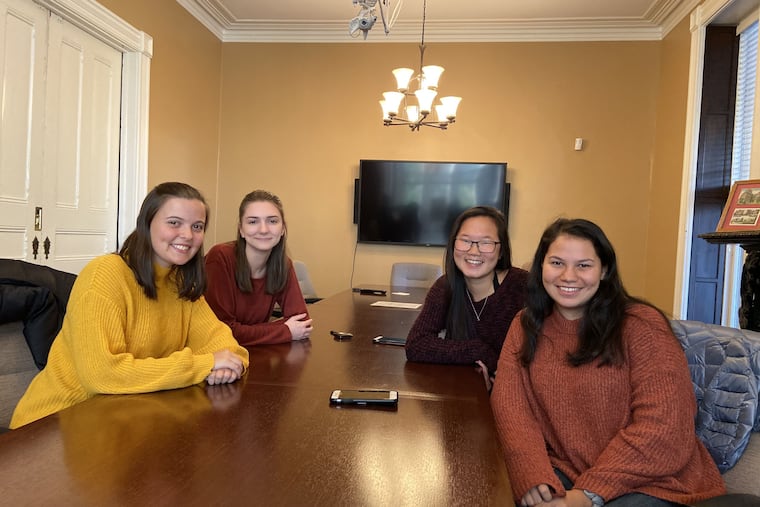Students at Lafayette College are on a mission: To spread happiness
The student-run happiness project at Lafayette is aiming to spread happiness on the 2,600-student campus, student by student, smile by smile.

EASTON, Pa. — As Lafayette College administrator Annette Diorio climbed the stairs in her office building earlier this fall, she saw a Post-it note on the mirror: “You look awesome today.”
Diorio, vice president for campus life, said she “couldn’t help but smile."
That’s exactly what sophomore Taylor Stone and her fellow collaborators were hoping for when they started the "Lafayette Happiness Project” this year at the liberal arts college. Their mission, she said, is to spread happiness on the 2,600-student campus, student by student, smile by smile.
One method was to send about 30 members of their group across campus, posting notes with positive messages on walls, poles, mirrors, white boards, and anywhere else sure to catch a glance.
“It can be a really stressful time at a school like Lafayette, so we wanted to do anything to lower stress levels in any way we could,” said Stone, 19, a sophomore psychology major from Princeton and group president.
Lafayette isn’t the first college to have a student group dedicated to happiness. Harvard, the University of Texas-Austin, Stanford, and Penn State University have had them. (Penn State’s no longer is operating, but it is “Happy Valley,” after all.) Northwestern University in Evanston, Ill., has one of the longest-running groups, dating back nearly a decade.
Their presence and mission could become increasingly important as turmoil at the nation’s highest levels swirls amid a news cycle often filled with little that is uplifting. The demand for counseling and psychological services on many campuses also continues to rise, with levels of depression, anxiety, and feelings of isolation.
“It seems like happiness is in short supply, or at least in high demand,” said Katherine Scharfenberg, a doctoral candidate in the English department and adviser to Northwestern’s club.
Interest at Northwestern has increased this year, with 1,600 people signed up to receive the group’s weekly email blasts and more students attending events, she said. The group holds spa days, bonfires, and carnivals, offers hot chocolate in the library before finals, and hosts movie nights.
One of its most popular events is “Pie a Professor,” which coincides with the annual March holiday of the mathematical symbol pi. Professors sit on a tarp, wearing rain ponchos while students hurl paper plates filled with whipped cream at them. And people eat pie.
“This year, we are hoping to get the university president to partake,” said Kayla Bernard, 20, club president and a biology and environmental sciences major from Michigan.
Student-led happiness initiatives that foster acts of kindness can help a campus, said Richard Tyler-Walker, president of the American College Counseling Association and associate director of the counseling center at North Carolina State University.
“That moment of positivity can be very restorative,” he said. “It can help shift a mind-set.”
The group at Lafayette got its start when Stone and three friends, then freshmen, were talking last spring about how to get more involved on campus. They also missed their dogs from home. Stone’s is a Portuguese water dog named “Eiffel,” after the tower. (Her family loves France.)
So they thought it would be great to start bringing therapy dogs on campus to greet students. Then their idea grew: They wanted to spread happiness through random acts of kindness and find other ways to help classmates cope with stress, Stone said.
In college, students and staff say, stress comes from multiple sources — demanding academics, social pressures, jobs, parental expectations, and athletics. Just managing time can be challenging, Stone said. Sophia Hilger, 19, another group leader, has majors in anthropology and sociology and government law.
“Every student here is involved in so much,” Stone said. “It’s kind of just the time management, and to have time for yourself to just calm down and be happy.”
This month, they brought four therapy dogs to campus, drawing about 200 students. By then, most people were familiar with the group’s posted notes such as: “A fun fact: Otters hold hands when they sleep so they don’t float away from each other.”
The group’s work has drawn kudos from faculty.
“It’s an absolutely terrific idea to make happiness and well-being a focus," said Elaine Reynolds, professor of biology and neuroscience. “I love that these students are taking the initiative and reaching out to other students to release stress levels.”
Colleges organize activities to do the same, she said, but students know best what works for them.
“This group has a chance to make a difference on our campus,” she said.
» READ MORE: Can you teach students to be happy? Colleges are trying.
Their Instagram page, run by Hilger, has drawn almost 200 followers.
Students also cohosted a cocoa and coloring event with the psychology club. The event featured puzzles and Slime, too.
“I know for me, personally, I had an exam earlier in the day, and I was really stressed out,” said Presley Anderson, 19, a sophomore psychology major from Hawaii and a group leader. “So going to this event and just playing with Slime was honestly therapeutic and stress-relieving.”
Last week, as Thanksgiving approached, they set up a table in the student center during lunch and allowed people to write thank-you notes to friends; group members then delivered the messages.
Next semester, they hope to bring in speakers and hold raffles. They also want to create a wall on campus where people can leave positive messages for others and take one when they need it.
But first they must get funding from student government. They’ve funded projects this semester themselves and by cohosting events with other organizations.
Diorio, the vice president, said she’s pretty sure the students will get the money from someone, even if it’s not student government.
“Probably from someone sitting right in this room," she said with a smile.